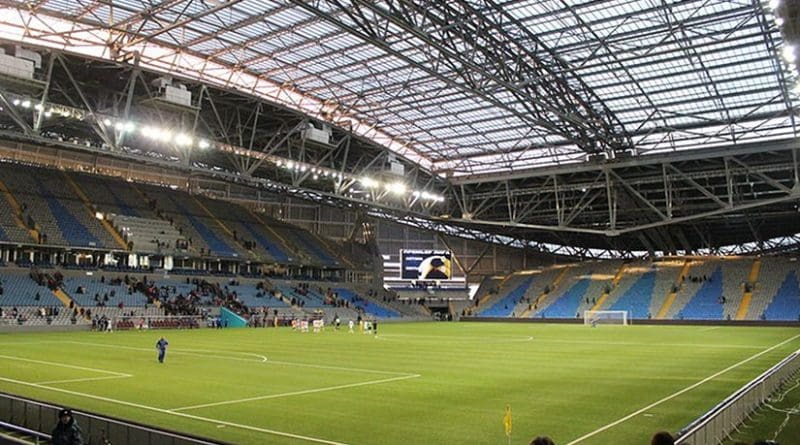Football In Kazakhstan: A Tale Of Two Cities
By Eurasianet
By Chris Rickleton*
A spring gust whips dust across the surface of the running track at the Kazhymukan Munaitpasov Stadium in Astana, but the football team that called the ground its home for decades before the city became Kazakhstan’s capital in 1997 is unlikely to flower again.
The club that began life as Dynamo Tselinograd in 1964 and ended it as FC Astana-1964 in 2014 was condemned to oblivion by debt and a lack of interest from the city administration that had maintained it in the twilight of its existence.
But hardcore fans of the club, which played its football in the older, more Soviet-looking half of the 900,000-strong city, attribute their club’s demise instead to the emergence in 2009 of a new project enjoying backing from top government officials.
A 25-minute drive from the 12,000-seater Munaitpasov Stadium, across the Ishym River that divides the city’s old and new sections, is the 30,000-capacity Astana Arena. The new stadium cost $185 million to build and was inaugurated with a symbolic kick of a football by President Nursultan Nazarbayev himself.
The first game played there in 2009 was between the national youth team and the newly formed Lokomotiv Astana — rebranded FC Astana in 2011 — who have since become the only club from the country to play in the group stages of the UEFA Champions League.
But many fans of the older club have been unable to take the new one into their hearts.
“I wouldn’t go to that stadium in a hundred years,” says 31-year-old Astana-born Beibut Imbayev, a member of the Legion supporters association, which was founded to save the historic club after it fell into bankruptcy at around the time Lokomotiv was founded.
“Not even if they won the Champions League itself!”
For a time, the two clubs — one representing the city’s Soviet past, the other its corporate future — enjoyed an awkward coexistence.
In 2012, the two sets of fans had to be separated by police after clashing during a feisty cup contest that the new team, then backed by Kazakhstan’s state railway company, won by a single goal.
The year before Lokomotiv’s leadership was moved to send a note of complaint to its FC Astana-1964 counterpart regarding the behavior of the Legion fan group, which had taken to slandering the club in online forums and plastering stickers across the city comparing it to a condom.
Yet for members of Imbayev’s 30-strong fan association, the final blow to hopes of survival was struck by a man associated with a period of peak success for the club, which has changed name six times in its history.
During his first term in office, Astana’s present Mayor Adilbek Zhaksybekov had overseen a period of unprecedented success at the capital’s club — then called Zhenis, or Victory — winning the league three times in the post-millennium era as a toiling team was reinvigorated by funds from the newly flush mayor’s office.
But when Zhakysbekov’s second term in office began in 2014, he started publicly questioning the need for the old club and suggested the city instead get behind the newly minted FC Astana, which had by then acquired its yellow and blue colors.
“When we had our 40th anniversary in 2004, it was Zhakysbekov’s initiative to commission a book commemorating our history,” said Nurlan Kaymanov, another member of the Legion fan association, while riding in the back seat of Imbayev’s white Kia hatchback. “But his views changed. He started to speak against our team and show support for the new project.”
Imbayev and Kaymanov insist their efforts to revive their club through persistent and fruitless lobbying of local power brokers and businessmen were not expressly political.
Like many Kazakhs, they direct complaints towards officials in unspecific terms and avoid singling out particular individuals, especially Nazarbayev. But the aging leader’s role is unmistakable since FC Astana was created under the auspices of the multi-discipline Astana Presidential Sports Club, whose creation Nazarbayev personally ordered in 2012.
Imbayev and Kaymanov instead cite solidarity with football supporters across the world harnessing fan power to fight what they perceive as attacks on the history and traditions of their clubs.
Imbayev cites the example of FC United of Manchester, a grassroots English football club created in 2005 by fans in protest at the takeover of Manchester United by US businessman Malcolm Glazer.
“We lack a proper culture of football support in Kazakhstan. Especially in Astana, where more than half the population comes from other cities,” Imbayev told EurasiaNet.org. “People that went to watch FC Astana play in the Champions League went to watch the Champions League. The club itself has few real fans, no real history.”
As Imbayev and Kaymanov look out across the redundant 12,000-seater ground, waxing nostalgic about legendary players, and the time their club narrowly missed out on Champions League qualification in 2002, Kazakhstan’s young capital begins to seem as if it has been built over other people’s memories.
But some, including the Astana-born press officer of the new club, Dmitri Nesterenko, are less inclined to be sentimental.
“Yes, there are people that regret the demise of that team,” Nesterenko told EurasiaNet.org on the sidelines of an FC Astana training session at the Astana Arena, overseen by Bulgarian coach Stanimir Stoilov and involving players from Serbia, Nigeria and Colombia as well as Kazakhstan. “But regrets or no regrets, you will not bring it back.”
*Chris Rickleton is a freelance writer who specializes in Central Asia.

